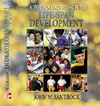|
 |  Life-Span Development: A Topical Approach John W. Santrock
Cognitive Processes and Development Language Development
Web LinksPragmatic Language
(http://www.kidsource.com/asha/language_tips.html)
Provides pragmatic language tips, examines adaptive language use, and evaluates conversation skills in young children. |
 |  |  | Brain and Language Development
(http://www.salk.edu/faculty/bellugi.html)
The website of Ursula Bellugi, a leading researcher in the biological foundations of language and cognition. Describes her research interests and lists her recent publications. |
 |  |  | Critical Period Hypothesis in Language
(http://linguist.emich.edu/~ask-ling/archive-1998.7/msg00070.html)
At this website, individuals can ask a linguist a question and get a reply. One recent topic focused on the critical period hypothesis in language. |
 |  |  | Genie
(http://www.pbs.org/wgbh/nova/transcripts/2112gchild.html)
An in-depth discussion about Genie, who grew up as a wild child, and her language development. |
 |  |  | Communicating with Babies
(http://www2.edc.org/NCIP/library/ec/Power_7.htm)
Good strategies for guiding infants' language development. |
 |  |  | Babbling
(http://www.jhu.edu/~jhumag/0298web/baby.html)
An in-depth look at the origins and functions of babbling. |
 |  |  | Language Milestones
(http://www.altonweb.com/cs/downsyndrome/splangmi.html)
Explore language milestones at age one, between one and two, and between two and three. |
 |  |  | The Naming Explosion
(http://www.ccp.uchicago.edu/overview/developmental/amanda.ss.html)
Examines the naming explosion that usually takes place between 18-24 months of age. |
 |  |  | Reading Research
(http://www.nichd.nih.gov/publications/pubs/readbro.htm)
Research from the National Institute of Child Health and Human Development addresses why children succeed or fail at reading. |
 |  |  | Reading
(http://www.indiana.edu/~eric_rec/ieo/digests/menuall.html)
The ERIC Clearinghouse on Reading, English, and Communication website. Includes an abundance of information about reading and relevant links. Among the topics are current research summaries, parental involvement in reading, children's literature on-line, and poetry. |
 |  |  | Children's Literature
(http://www.acs.ucalgary.ca/~dkbrown/)
The Children's Literature Web Guide. Links to such topics as authors on the web, stories on the web, recommended books, the latest award winning books for children, resources for teachers, resources for parents, and resources for storytellers. |
 |  |  | Children's Writing
(http://www.acs.ucalgary.ca/~dkbrown/writings.html)
Provides links to locations where children can publish their writing on-line. |
 |  |  | Supporting Children's Writing
(http://www.parenthoodweb.com/parent_cfmfiles/pros.cfm/84)
Good ideas for helping young children write in a relaxed, supportive way. |
 |  |  | Bilingual Education
(http://www.edb.utexas.edu/coe/depts/ci/bilingue/resources.html)
The website of the National Clearinghouse for Bilingual Education. An outstanding website with extensive information and links to other bilingual education sites. |
 |  |  | Multilingual Multicultural Research
(http://www-rcf.usc.edu/~cmmr/)
The website of the Center for Multilingual Multicultural Research at the University of Southern California. Includes a description of a number of research programs on such topics as bilingualism and literacy, language policy and planning, global learning networks, language proficiency testing, and integrating language and content instruction in the classroom. |
|
|



 2002 McGraw-Hill Higher Education
2002 McGraw-Hill Higher Education